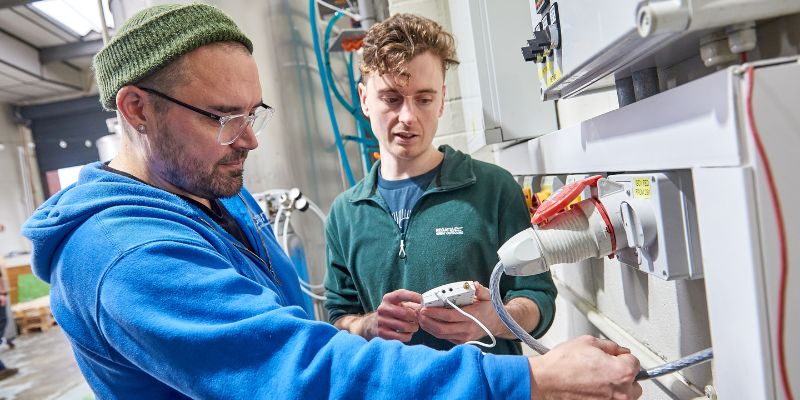Carbon calculator to improve sustainability in craft beer sector

A “carbon footprint calculator” has been created to help small craft brewers identify the scale of their carbon emissions.
Developed by a research team led by the University of Leeds, the freely available calculator – which can be downloaded as an Excel document from the figshare website – will enable breweries to see how sustainable their operations are.
There is a wide variation in the carbon emissions produced by craft brewers, with packaging playing a key role. Beer distributed in 20 litre steel kegs has a carbon footprint seven times smaller than that distributed in 330 ml glass bottles – 205 versus 1,483 grams of CO2 equivalent per litre of beer.
With independent brewers, which includes the craft beer industry, showing signs of bouncing back after lockdown, the researchers are keen to help these small to medium size enterprises develop best practice when it comes to sustainability and in cutting carbon emissions.
Data published by Statista in December showed that there were 1,902 independent breweries in the UK in 2021, an increase of 86 over the 2020 figure.
The research paper accompanying the carbon calculator – “Development of an open-source carbon footprint calculator of the UK craft brewing value chain” – has been published in the Journal of Cleaner Production.
Making it easier to calculate carbon emissions
For small brewers, sourcing the key facts and figures needed to calculate their carbon footprint is both expensive and technically challenging, and can require the use of proprietary software.
Alexander Bowler, a researcher in the School of Food Science and Nutrition at Leeds in collaboration with researchers at the universities of Nottingham and Sheffield has created an open-source calculator which will guide brewery managers through the process, simply and at no cost.
Baseline data “hard-wired” into the calculator will enable brewery managers to estimate carbon emissions across the entire production process, from growing and sourcing raw ingredients to producing and transporting the beer, with account taken of the way the beer is packaged, which can have a big effect on carbon emissions.
Dr Bowler said: “When a small brewery is doing its carbon reporting, one of the challenges is finding a lot of the numbers you need to use.
“For example, transport emissions or emissions associated with energy usage are quite easy to source, but there are lots of other data to do with materials such hops and barley that are harder to find.
“You need these numbers and specialist conversion factors, and we have got them all in the carbon footprint calculator from reference sources.”
Brewery staff input their production data into the calculator and the calculator produces a figure for overall carbon emissions with a breakdown for different stages of the value chain.
Improving the accuracy of carbon reporting
Marcos Ramirez runs the Piglove Brewing Company in Leeds with two colleagues which produces 12,000 litres – just over 21,000 pints – of beer a month. He says the calculator will improve the accuracy of the estimates of his brewery’s carbon emissions.
“As a business we have a responsibility to society to reduce our carbon footprint, but we operate in a niche market and finding the baseline data to calculate carbon emissions is challenging,” he said.
“There are a lot of tools that can be applied more generally but nothing to help with very specialised industries like brewing, where often the baseline data we have had to rely on comes from the US – and that introduces inaccuracies into our calculations. So, this new calculator will be a major improvement.”
Professor David Cook, Professor of Brewing Science at the University of Nottingham and co-author of the paper, said: “Whilst there are companies offering their own carbon calculators and consultancy to the industry, the beauty of this tool is that it is hands on for the brewers themselves and will be accurate enough to point them towards the main areas they need to focus on in the journey towards net zero.
“Helping brewers stay at the centre of key decisions impacting their carbon footprint will drive improved competitiveness and performance by raising awareness across the sector.”
Smart sensors to improve sustainability
Professor Nik Watson, also from the School of Nutrition and Science at Leeds who oversaw the research, said once small breweries have a picture of their carbon emissions, they can then look at ways of reducing them, and that will have wider sustainability benefits.
His team is working with the Piglove brewery to identify how low-cost sensors can be used to measure the efficiency of parts of the production process such as water use, energy consumption and minimising waste.
They are also using a probe based on the principle of a tuning fork to measure the resonance and hence the density of wort in the fermentation vessels – to judge whether the beer is ready to package.
The sensor is part of a cloud-based technology developed by a company called Plaato that sends data to a mobile phone.
Professor Watson said: “These are small businesses, and they cannot afford the high-end sensors that the large breweries use. But there are other, smaller smart instruments that can be harnessed.
“By working with breweries, we can show that sensors can provide real data and that can help them with decisions about changes to production processes or raw materials to reduce carbon emissions and improve sustainability.
“This real data will show how various interventions are working. Many people involved in the craft brewing industries are natural innovators and they want to make their operations as green as possible.”
Featured image: Professor Nik Watson (left) and Dr Alexander Bowler (right).
